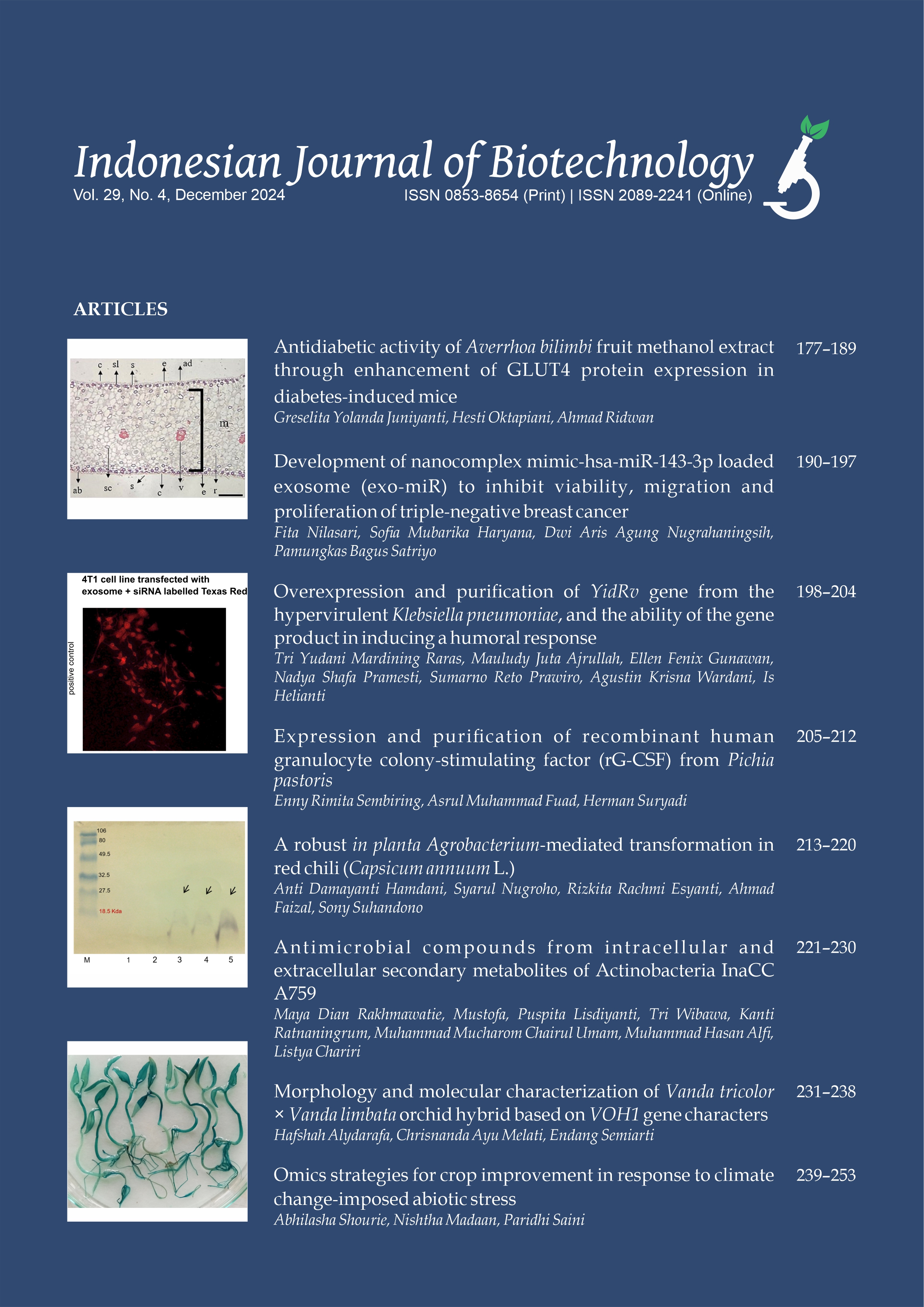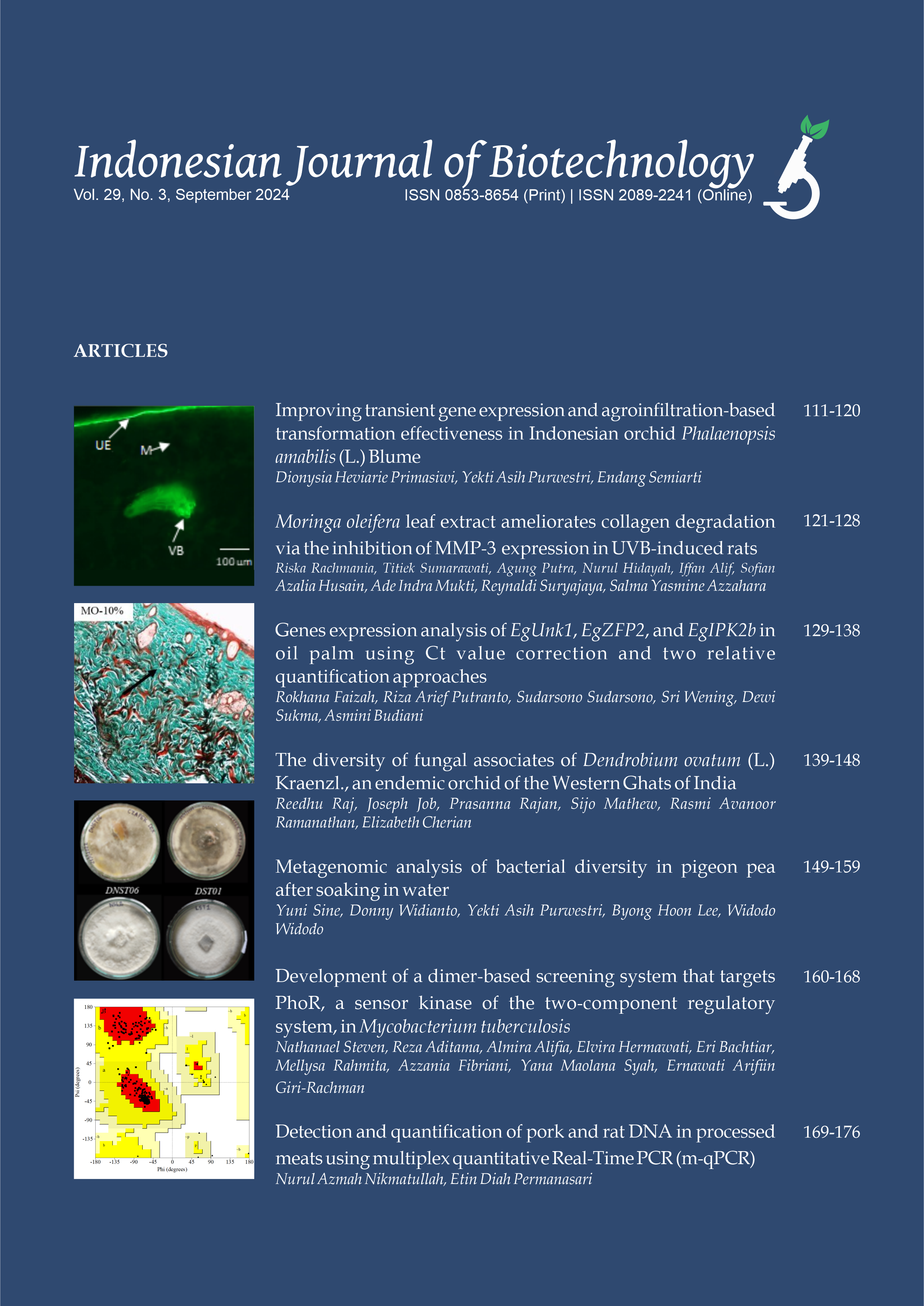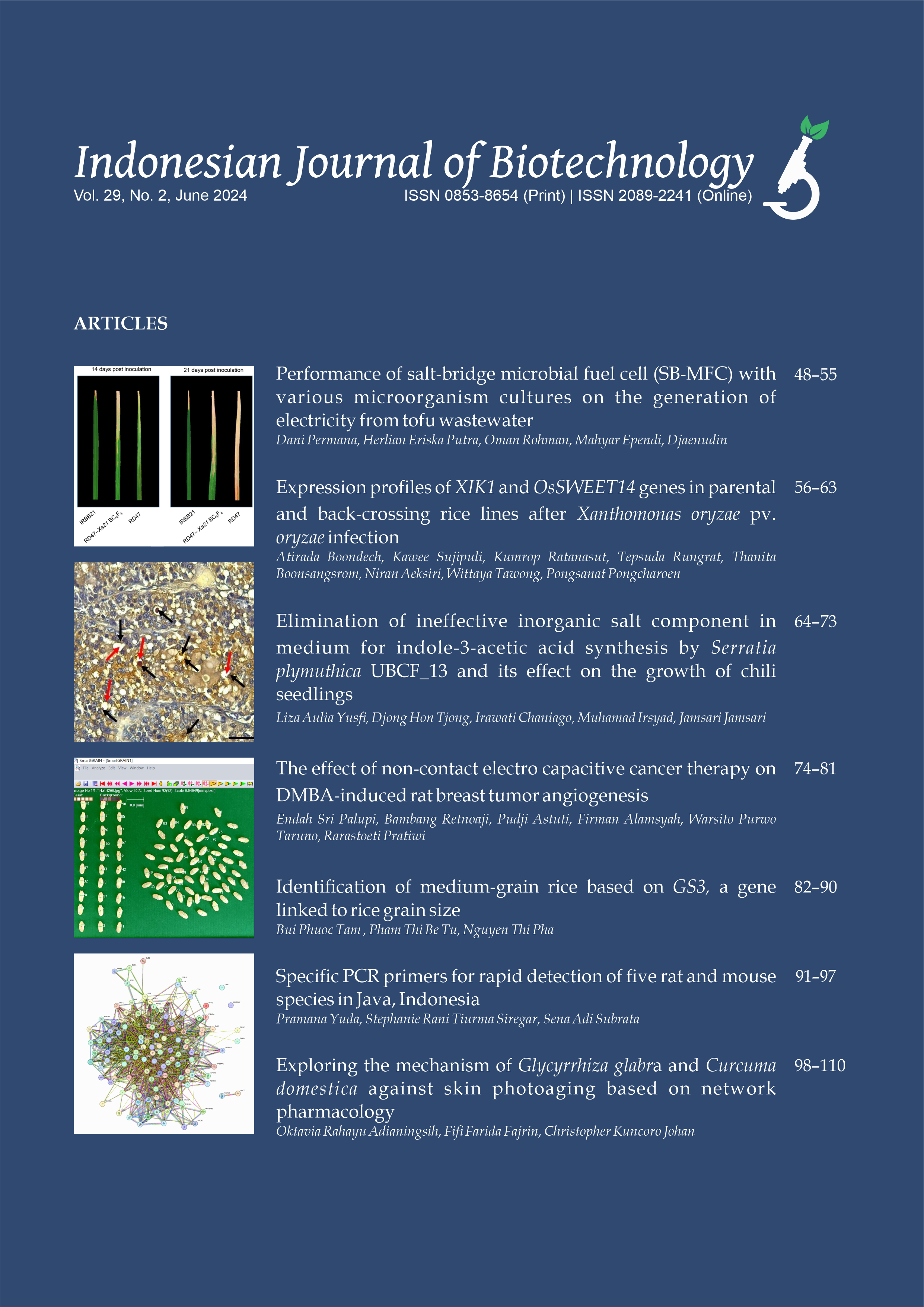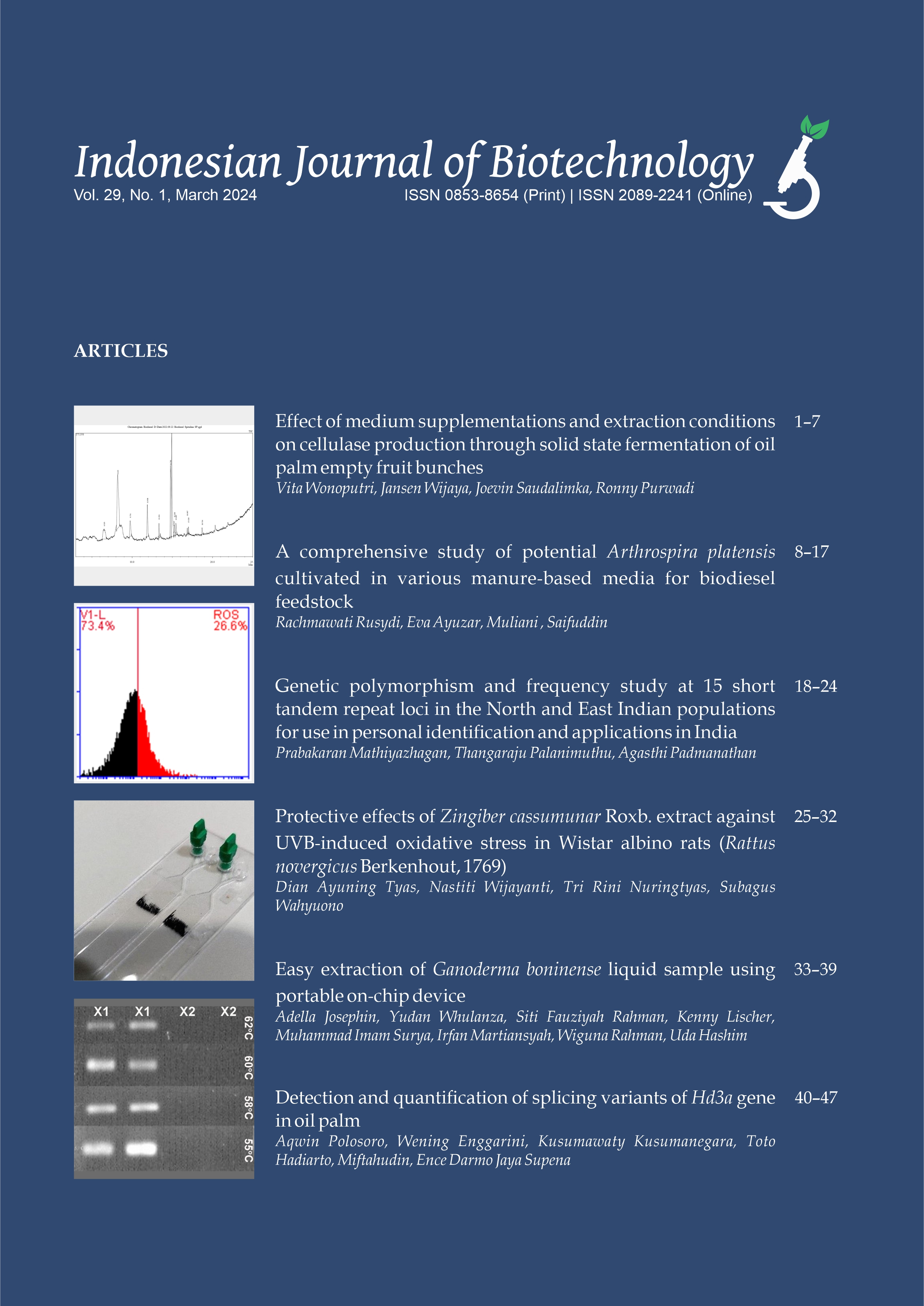Revealing disease‐specific endogenous target mimic of microRNA from long non‐coding RNA identification and characterization in Musa spp.
Audie Masola Putra(1), Husna Nugrahapraja(2*), Fenny Martha Dwivany(3)
(1) School of Life Sciences and Technology, Institut Teknologi Bandung, Jalan Ganesha No. 10, Bandung, West Java 40132, Indonesia
(2) School of Life Sciences and Technology, Institut Teknologi Bandung, Jalan Ganesha No. 10, Bandung, West Java 40132, Indonesia; Bioscience and Biotechnology Research Center, Institut Teknologi Bandung, Jalan Ganesha No. 10, Bandung, West Java 40132, Indonesia
(3) School of Life Sciences and Technology, Institut Teknologi Bandung, Jalan Ganesha No. 10, Bandung, West Java 40132, Indonesia; Bali International Research Center for Banana, Badung, Bali, 80361, Indonesia; Bioscience and Biotechnology Research Center, Institut Teknologi Bandung, Jalan Ganesha No. 10, Bandung, West Java 40132, Indonesia
(*) Corresponding Author
Abstract
Banana (Musa spp.) is one of the most widely consumed fruits in the world. Unfortunately, the plants are at risk from many disease problems, which mainly derive from microorganism. It is a little known about the relationship between disease‐inducing microorganisms and plants, particularly at the molecular level. This research aimed to characterize long non‐coding RNA (lncRNA) from bananas that may have roles in regulating gene expression related to the disease response mechanism in banana derived from transcriptomic libraries. Furthermore, the detected transcripts were analyzed to identify the endogenous target mimics (eTMs) interaction between lncRNA and microRNA (miRNA) using computational approaches. Data from Cavendish banana (AAA group), Berangan (AAA group), Yunnan Banana (Itinerans), Dajiao (ABB group), and Klutuk (BB group) were used in this research. We found that lncRNA tends to be unsustainable, and most sizes are below 1000 bp (≥ 75%). Based on this result, we investigated the eTMs to determine lncRNA transcripts and miRNA, such as miR397 in Cavendish and miR444 in Klutuk. This transcript would be regulated following exposure to extreme temperatures and disease, indicating the possibility of disease‐specific interaction between bananas and their environment at the molecular level.
Keywords
Full Text:
PDFReferences
Backiyarani S, Uma S, Saraswathi MS, Saravanakumar AS, Chandrasekar A. 2015. Transcriptome analysis of banana (Musa balbisiana) based on nextgeneration sequencing technology. Turkish J. Agric. For. 39(5):1–13. doi:10.3906/tar1406171.
Ballantyne MD, McDonald RA, Baker AH. 2016. lncRNA/MicroRNA interactions in the vasculature. Clin. Pharmacol. Ther. 99(5):494–501. doi:10.1002/cpt.355.
Benson DA, Cavanaugh M, Clark K, KarschMizrachi I, Lipman DJ, Ostell J, Sayers EW. 2017. GenBank. Nucleic Acids Res. 45(D1):D37–D42. doi:10.1093/nar/gkw1070.
Borah P, Das A, Milner MJ, Ali A, Bentley AR, Pandey R. 2018. Long noncoding rnas as endogenous target mimics and exploration of their role in low nutrient stress tolerance in plants. Genes (Basel). 9(9):459. doi:10.3390/genes9090459.
Cheesman E. 1948. Classification of the bananas II. The genus Musa L. Kew Bulletin 2:106–117. Clark MB, Mattick JS. 2011. Long noncoding RNAs in cell biology. Semin. Cell Dev. Biol. 22(4):366–376. doi:10.1016/j.semcdb.2011.01.001.
Dai X, Zhuang Z, Zhao PX. 2018. PsRNATarget: A plant small RNA target analysis server (2017 release). Nucleic Acids Res. 46(W1):W49–W54. doi:10.1093/nar/gky316.
Davey MW, Gudimella R, Harikrishna JA, Sin LW, Khalid N, Keulemans J. 2013. ”A draft Musa balbisiana genome sequence for molecular genetics in polyploid, inter and intraspecific Musa hybrids”. BMC Genomics 14(1):683. doi:10.1186/1471216414683.
Deng S, Cheng C, Liu Z, Chen Y, Zhang Z, Huang Y, Lin Y, Wang T, Lai Z. 2018. Comparative transcriptome analysis reveals a role for anthocyanin biosynthesis genes in the formation of purple peel in Minhou wild banana (Musa itinerans Cheesman). J. Hortic. Sci. Biotechnol. 94(2):1–17. doi:10.1080/14620316.2018.1473055.
D’hont A, Denoeud F, Aury JM, Baurens FC, Carreel F, Garsmeur O, Noel B, Bocs S, Droc G, Rouard M, Da Silva C, Jabbari K, Cardi C, Poulain J, Souquet M, Labadie K, Jourda C, Lengellé J, RodierGoud M, Alberti A, Bernard M, Correa M, Ayyampalayam S, Mckain MR, LeebensMack J, Burgess D, Freeling M, MbéguiéAMbéguié D, Chabannes M, Wicker T, Panaud O, Barbosa J, Hribova E, HeslopHarrison P, Habas R, Rivallan R, Francois P, Poiron C, Kilian A, Burthia D, Jenny C, Bakry F, Brown S, Guignon V, Kema G, Dita M, Waalwijk C, Joseph S, Dievart A, Jaillon O, Leclercq J, Argout X, Lyons E, Almeida A, Jeridi M, Dolezel J, Roux N, Risterucci AM, Weissenbach J, Ruiz M, Glaszmann JC, Quétier F, Yahiaoui N, Wincker P. 2012. The banana (Musa acuminata) genome and the evolution of monocotyledonous plants. Nature 488(7410):213– 217. doi:10.1038/nature11241.
Duan F, Jiang J, Song C, Wang P, Ye H, Dai L. 2018. Functional long noncoding RNAs associated with gastric cancer susceptibility and evaluation of the epidemiological e ffi cacy in a central Chinese population. Gene 646(January):227–233. doi:10.1016/j.gene.2017.12.063.
Dwivany FM, Nugrahapraja H, Sari LDN, Putri RR, Novianti C. 2021. Transcriptome dataset of ethylenetreated Klutuk Wulung banana. Data in Brief 38:107376. doi:10.1016/j.dib.2021.107376.
Fei S, Czislowski E, Fletcher S, Peters J, Batley J, Aitken E, Mitter N. 2019. Small RNA profiling of Cavendish banana roots inoculated with Fusarium oxysporum f. sp. cubense race 1 and tropical race 4. Phytopathol. Res. 1:22. doi:10.1186/s4248301900293.
FrancoZorrilla JM, Valli A, Todesco M, Mateos I, Puga MI, Rubiosomoza I, Leyva A, Weigel D, García JA, Pazares J, Puga I, Francozorrilla M, Todesco M, Mateos I, Pazares J, Rubiosomoza I, Leyva A, Weigel D, Garcı JA. 2007. Target mimicry provides a new mechanism for regulation of microRNA activity. Nat. Genet. 39(8):1033–1037. doi:10.1038/ng2079.
Hapsari L, Lestari DA. 2016. Fruit characteristic and nutrient values of four Indonesian banana cultivars (Musa spp.) at different genomic groups. Agrivita 38(3):303–311. doi:10.17503/agrivita.v38i3.696.
JonesRhoades MW, Bartel DP. 2004. Computational Identification of Plant MicroRNAs and Their Targets, Including a StressInduced miRNA. Molecular Cell 14(6):787–799. doi:10.1016/j.molcel.2004.05.027.
Kang C, Liu Z. 2015. Global identification and analysis of long noncoding RNAs in diploid strawberry Fragaria vesca during flower and fruit development. BMC Genomics 16(1):1–15. doi:10.1186/s12864 01520142.
Kim ED, Sung S. 2012. Long noncoding RNA: Unveiling hidden layer of gene regulatory networks. Trends in Plant Science 17(1):16–21. doi:10.1016/j.tplants.2011.10.008.
Leinonen R, Akhtar R, Birney E, Bower L, CerdenoTárraga A, Cheng Y, Cleland I, Faruque N, Goodgame N, Gibson R, Hoad G, Jang M, Pakseresht N, Plaister S, Radhakrishnan R, Reddy K, Sobhany S, Hoopen PT, Vaughan R, Zalunin V, Cochrane G. 2011. The European nucleotide archive. Nucleic Acids Res. 39(SUPPL. 1):44–47. doi:10.1093/nar/gkq967.
Lesk AM. 2005. Database Annotation in Molecular Biology: Principles and Practice. John Wiley & Sons, Ltd. URL https://onlinelibrary.wiley.com/doi/book/1 0.1002/0470012420.
Li D, Yang MQ. 2017. Identification and characterization of conserved lncRNAs in human and rat brain. BMC Bioinformatics 18:489. doi:10.1186/s12859 01718907.
Li L, Eichten SR, Shimizu R, Petsch K, Yeh CT, Wu W, Chettoor AM, Givan SA, Cole RA, Fowler JE, Evans MM, Scanlon MJ, Yu J, Schnable PS, Timmermans MC, Springer NM, Muehlbauer GJ. 2014. Genomewide discovery and characterization of maize long noncoding RNAs. Genome Biol. 15(2):R40. doi:10.1186/gb2014152r40.
Liu J, Wang H, Chua NH. 2015. Long noncoding RNA transcriptome of plants. Plant Biotechnol. J. 13(3):319–328. doi:https://doi.org/10.1111/pbi.12336.
Liu W, Cheng C, Lin Y, XuHan X, Lai Z. 2018. Genomewide identification and characterization of mRNAs and lncRNAs involved in cold stress in the wild banana (Musa itinerans). PLoS One 13(7):1–27. doi:10.1371/journal.pone.0200002.
Ma L, Bajic VB, Zhang Z. 2013. On the classification of long noncoding RNAs. RNA Biol. 10(6):924–933. doi:10.4161/rna.24604. Muthusamy M, Uma S, Backiyarani S, Saraswathi MS, Chandrasekar A. 2016. Transcriptomic Changes of DroughtTolerant and Sensitive Banana Cultivars Exposed to Drought Stress. Frontiers Plant. Sci. 7(November):1–14. doi:10.3389/fpls.2016.01609.
Muthusamy M, Uma S, Suthanthiram B, Saraswathi MS, Chandrasekar A. 2019. Genomewide identification of novel, long noncoding RNAs responsive to Mycosphaerella eumusae and Pratylenchus coffeae infections and their differential expression patterns in diseaseresistant and sensitive banana cultivars. Plant Biotechnol. Rep. 13(1):73–83. doi:10.1007/s11816 01800514z.
Peri S, Roberts S, Kreko IR, McHan LB, Naron A, Ram A, Murphy RL, Lyons E, Gregory BD, Devisetty UK, Nelson AD. 2020. Read Mapping and Transcript Assembly: A Scalable and HighThroughput Workflow for the Processing and Analysis of Ribonucleic Acid Sequencing Data. Front. Genet. 10:1915–1927. doi:10.3389/fgene.2019.01361.
Ravishankar KV, Sampangiramaiah MH, Ajitha R, Khadke GN, Chellam V. 2015. Insights into Musa balbisiana and Musa acuminata species divergence and development of genic microsatellites by transcriptomics approach. Plant Gene 4:78–82. doi:10.1016/j.plgene.2015.09.007.
Rozen S, Skaletsky H. 2000. Primer3 on the WWW for general users and for biologist programmers. Methods Mol. Biol. 2000(132):365–386. doi:10.1385/1 592591922:365.
SampangiRamaiah MH, Ravishankar KV, Rekha A, Hastantram M, Ramaiah S, Venkataramana K, Ajitha R. 2019. Long noncoding RNAs in banana : prediction , mapping and their comparative studies using Musa balbisiana and Musa acuminata transcriptome. Trees 33(2):359–369. doi:10.1007/s0046801817811.
Setiabudi E, Meitha K, Dwivany FM. 2021. In silico characterization and comparison of the fruit ripening related betaamylase (BAM) gene family in banana genome A and B. Indones. J. Biotechnol. 26(4):175– 182. doi:10.22146/ijbiotech.65142.
Trapnell C, Roberts A, Goff L, Pertea G, Kim D, Kelley DR, Pimentel H, Salzberg SL, Rinn JL, Pachter L. 2014. Erratum: Differential gene and transcript expression analysis of RNAseq experiments with TopHat and Cufflinks. Nat. Protoc. 9(10):2513. doi:10.1038/nprot.2012.016.
Trapnell C, Williams BA, Pertea G, Mortazavi A, Kwan G, Van Baren MJ, Salzberg SL, Wold BJ, Pachter L. 2010. Transcript assembly and quantification by RNASeq reveals unannotated transcripts and isoform switching during cell differentiation. Nat. Biotechnol. 28(5):511–515. doi:10.1038/nbt.1621.
Wang H, Jiao X, Kong X, Hamera S, Wu Y, Chen X, Fang R, Yan Y. 2016. A Signaling Cascade from miR444 to RDR1 in Rice Antiviral RNA Silencing Pathway. Plant Physiol. 170(4):2365–2377. doi:10.1104/pp.15.01283.
Wang J, Yu W, Yang Y, Li X, Chen T, Liu T, Ma N, Yang X, Liu R, Zhang B. 2015. Genomewide analysis of tomato long noncoding RNAs and identification as endogenous target mimic for microRNA in response to TYLCV infection. Sci. Rep. 5:16946. doi:10.1038/srep16946.
Wang KC, Chang HY. 2011. Molecular Mechanisms of Long Noncoding RNAs. Molecular Cell 43(6):904– 914. doi:10.1016/j.molcel.2011.08.018.
Wu W, Yang Yl, He Wm, Rouard M, Li Wm, Xu M, Roux N, Ge XJ. 2016. Whole genome sequencing of a banana wild relative Musa itinerans provides insights into lineagespecific diversification of the Musa genus. Sci. Rep. 6(31586):1– 11. doi:10.1038/srep31586.
Yang Qs, Gao J, He Wd, Dou Tx, Ding Lj, Wu Jh, Li CY, Peng Xx, Zhang S, Yi GJ. 2015. Comparative transcriptomics analysis reveals difference of key gene expression between banana and plantain in response to cold stress. BMC Genomics 16:1–18. doi:10.1186/s128640151551z.
Yu T, Tzeng DT, Li R, Chen J, Zhong S, Fu D, Zhu B, Luo Y, Zhu H. 2019. Genomewide identification of long noncoding RNA targets of the tomato mads box transcription factor rin and function analysis. Ann. Bot. 123(3):469–482. doi:10.1093/aob/mcy178.
Zhao X, Li J, Lian B, Gu H, Li Y, Qi Y. 2018. Global identification of Arabidopsis lncRNAs reveals the regulation of MAF4 by a natural antisense RNA. Nat. Commun. 9(1):1–12. doi:10.1038/s41467018075007.
Zhu B, Yang Y, Li R, Fu D, Wen L, Luo Y, Zhu H. 2015. RNA sequencing and functional analysis implicate the regulatory role of long noncoding RNAs in tomato fruit ripening. Journal of Experimental Botany 66(15):4483–4495. doi:10.1093/jxb/erv203.
quet M, Labadie K, Jourda C, Lengellé J, RodierGoud M, Alberti A, Bernard M, Correa M, Ayyampalayam S, Mckain MR, LeebensMack J, Burgess D,Freeling M, MbéguiéAMbéguié D, Chabannes M,
Wicker T, Panaud O, Barbosa J, Hribova E, HeslopHarrison P, Habas R, Rivallan R, Francois P, Poiron
C, Kilian A, Burthia D, Jenny C, Bakry F, Brown S,
Guignon V, Kema G, Dita M, Waalwijk C, Joseph
S, Dievart A, Jaillon O, Leclercq J, Argout X, Lyons
E, Almeida A, Jeridi M, Dolezel J, Roux N, Risterucci AM, Weissenbach J, Ruiz M, Glaszmann JC,
Quétier F, Yahiaoui N, Wincker P. 2012. The banana (Musa acuminata) genome and the evolution of
monocotyledonous plants. Nature 488(7410):213–
217. doi:10.1038/nature11241.
Duan F, Jiang J, Song C, Wang P, Ye H, Dai L.
2018. Functional long noncoding RNAs associated with gastric cancer susceptibility and evaluation of the epidemiological e ffi cacy in a central
Chinese population. Gene 646(January):227–233.
doi:10.1016/j.gene.2017.12.063.
Dwivany FM, Nugrahapraja H, Sari LDN, Putri RR, Novianti C. 2021. Transcriptome dataset of ethylenetreated Klutuk Wulung banana. Data in Brief
38:107376. doi:10.1016/j.dib.2021.107376.
Fei S, Czislowski E, Fletcher S, Peters J, Batley J, Aitken
E, Mitter N. 2019. Small RNA profiling of Cavendish
banana roots inoculated with Fusarium oxysporum f.
sp. cubense race 1 and tropical race 4. Phytopathol.
Res. 1:22. doi:10.1186/s4248301900293.
FrancoZorrilla JM, Valli A, Todesco M, Mateos I, Puga
MI, Rubiosomoza I, Leyva A, Weigel D, García JA,
Pazares J, Puga I, Francozorrilla M, Todesco M, Mateos I, Pazares J, Rubiosomoza I, Leyva A, Weigel
D, Garcı JA. 2007. Target mimicry provides a new
mechanism for regulation of microRNA activity. Nat.
Genet. 39(8):1033–1037. doi:10.1038/ng2079.
Hapsari L, Lestari DA. 2016. Fruit characteristic and
nutrient values of four Indonesian banana cultivars
(Musa spp.) at different genomic groups. Agrivita
38(3):303–311. doi:10.17503/agrivita.v38i3.696.
JonesRhoades MW, Bartel DP. 2004. Computational
Identification of Plant MicroRNAs and Their Targets,
Including a StressInduced miRNA. Molecular Cell
14(6):787–799. doi:10.1016/j.molcel.2004.05.027.
Kang C, Liu Z. 2015. Global identification and analysis of long noncoding RNAs in diploid strawberry
Fragaria vesca during flower and fruit development.
BMC Genomics 16(1):1–15. doi:10.1186/s12864
01520142.
Kim ED, Sung S. 2012. Long noncoding RNA:
Unveiling hidden layer of gene regulatory networks. Trends in Plant Science 17(1):16–21.
doi:10.1016/j.tplants.2011.10.008.
Leinonen R, Akhtar R, Birney E, Bower L, CerdenoTárraga A, Cheng Y, Cleland I, Faruque N,
Goodgame N, Gibson R, Hoad G, Jang M, Pakseresht N, Plaister S, Radhakrishnan R, Reddy
K, Sobhany S, Hoopen PT, Vaughan R, Zalunin
V, Cochrane G. 2011. The European nucleotide
archive. Nucleic Acids Res. 39(SUPPL. 1):44–47.
doi:10.1093/nar/gkq967.
Lesk AM. 2005. Database Annotation in Molecular Biology: Principles and Practice. John Wiley & Sons,
Ltd. URL https://onlinelibrary.wiley.com/doi/book/1
0.1002/0470012420.
Li D, Yang MQ. 2017. Identification and characterization of conserved lncRNAs in human and rat brain.
BMC Bioinformatics 18:489. doi:10.1186/s12859
01718907.
Li L, Eichten SR, Shimizu R, Petsch K, Yeh CT, Wu
W, Chettoor AM, Givan SA, Cole RA, Fowler
JE, Evans MM, Scanlon MJ, Yu J, Schnable PS,
Timmermans MC, Springer NM, Muehlbauer GJ.
2014. Genomewide discovery and characterization
of maize long noncoding RNAs. Genome Biol.
15(2):R40. doi:10.1186/gb2014152r40.
Liu J, Wang H, Chua NH. 2015. Long noncoding
Plant RNA transcriptome of plants.Biotechnol. J. 13(3):319–328.doi:https://doi.org/10.1111/pbi.12336.
Liu W, Cheng C, Lin Y, XuHan X, Lai Z. 2018. Genomewide identification and characterization of mRNAs
and lncRNAs involved in cold stress in the wild
banana (Musa itinerans). PLoS One 13(7):1–27.
doi:10.1371/journal.pone.0200002.
Ma L, Bajic VB, Zhang Z. 2013. On the classification of
long noncoding RNAs. RNA Biol. 10(6):924–933.
doi:10.4161/rna.24604.
Muthusamy M, Uma S, Backiyarani S, Saraswathi MS,
Chandrasekar A. 2016. Transcriptomic Changes
of DroughtTolerant and Sensitive Banana Cultivars
Exposed to Drought Stress. Frontiers Plant. Sci.
7(November):1–14. doi:10.3389/fpls.2016.01609.
Muthusamy M, Uma S, Suthanthiram B, Saraswathi MS,
Chandrasekar A. 2019. Genomewide identification
of novel, long noncoding RNAs responsive to Mycosphaerella eumusae and Pratylenchus coffeae infections and their differential expression patterns in
diseaseresistant and sensitive banana cultivars. Plant
Biotechnol. Rep. 13(1):73–83. doi:10.1007/s11816
01800514z.
Peri S, Roberts S, Kreko IR, McHan LB, Naron A, Ram
A, Murphy RL, Lyons E, Gregory BD, Devisetty UK,
Nelson AD. 2020. Read Mapping and Transcript
Assembly: A Scalable and HighThroughput Workflow for the Processing and Analysis of Ribonucleic
Acid Sequencing Data. Front. Genet. 10:1915–1927.
doi:10.3389/fgene.2019.01361.
Ravishankar KV, Sampangiramaiah MH, Ajitha R,
Khadke GN, Chellam V. 2015. Insights into
Musa balbisiana and Musa acuminata species divergence and development of genic microsatellites
by transcriptomics approach. Plant Gene 4:78–82.
doi:10.1016/j.plgene.2015.09.007.
Rozen S, Skaletsky H. 2000. Primer3 on the WWW for
Article Metrics
Refbacks
- There are currently no refbacks.
Copyright (c) 2023 The Author(s)

This work is licensed under a Creative Commons Attribution-ShareAlike 4.0 International License.









